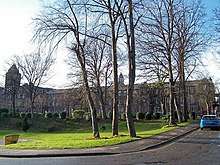Northern General Hospital
| Northern General Hospital | |
|---|---|
| Sheffield Teaching Hospitals NHS Foundation Trust | |
 Northern General Hospital | |
 Shown in South Yorkshire | |
| Geography | |
| Location | Fir Vale, Sheffield, Yorkshire and the Humber, England |
| Coordinates | 53°24′39″N 1°27′30″W / 53.41083°N 1.45833°WCoordinates: 53°24′39″N 1°27′30″W / 53.41083°N 1.45833°W |
| Organisation | |
| Care system | NHS |
| Hospital type | Teaching / large acute |
| Affiliated university |
The Medical School of the University of Sheffield The Faculty of Health and Wellbeing of Sheffield Hallam University |
| Services | |
| Emergency department | Yes |
| Beds | 1100 |
| History | |
| Founded | 1878 (as Fir Vale Workhouse) |
| Links | |
| Website | http://www.sth.nhs.uk |
| Other links | List of hospitals in England |
The Northern General Hospital is a large teaching hospital and Major Trauma Centre in Sheffield, England. Its departments include Accident and Emergency for adults, with children being treated at the Sheffield Children's Hospital on Western Bank. The hospital is managed by the Sheffield Teaching Hospitals NHS Foundation Trust.
History
The hospital has its origins in the Fir Vale workhouse and infirmary for which the foundation stone was laid in 1878.[1][2] When it opened in September 1881 the infirmary block had capacity for 366 patients.[1] A ward for treating women with venereal diseases was established in the 1890s.[1] The infirmary block was re-built and became the Sheffield Union Hospital when the workhouse was renamed the Fir Vale Institution in 1906.[1] The Sheffield Union Hospital became the Fir Vale Hospital and the Fir Vale Institution became Fir Vale House a few years later.[1]
In 1930 the names changed again and the Fir Vale Hospital became the City General Hospital and Fir Vale House became the Fir Vale Infirmary.[1] The City General Hospital performed the world’s first heart valve replacement operation in 1955 before it merged with the Fir Vale Infirmary to form the Northern General Hospital in 1967.[1] The hospital was the main receiving station for the victims of the Hillsborough disaster in 1989.[1] A post-operative surgical unit costing £21.3 million was opened in summer 2008.[3]
In June 2016, a new £2 million Helipad, funded by the Sheffield Hospital Charity and located close to the accident and emergency department, opened at the hospital.[4]
Services

The hospital consists of a series of buildings and wings, many of which are named after significant families and individuals from Sheffield, particularly in the steel industry:[5]
- The Huntsman Building: Named for Benjamin Huntsman, a manufacturer of cast or crucible steel, it is mostly orthopaedics but also contains the A&E, Surgical Assessment Centre (SAC), X-Ray departments, the theatres, one of four outpatients' departments, a large dining room and the site's main Medical Records department.
- The Firth Wing: Named for Mark Firth, an industrialist, it contains CCU, Vascular surgery and other surgical wards.
- The Chesterman Wing: Named for James Chesterman, a manufacturer of steel products, it contains the regional cardiology centre as well as extensive inpatient and outpatient facilities.
- The Vickers Corridor: Named for Edward Vickers, an industrialist, it deals primarily with renal and endocrine diseases but also contains departments of Sheffield Medical School and the Sheffield Kidney Institute.
- The Sorby Wing: Named for Henry Clifton Sorby, a microscopist and geologist, it contains the renal outpatients unit and the Metabolic Bone Centre.
- The Osborn Building: Named for Sir Samuel Osborn, a steelmaker, it contains the spinal unit.
- The Brearley Wing: Named for Harry Brearley, a metallurgist, it contains the respiratory and rehabilitation wards and a dining area as well as an outpatient department and a specialised Patient Discharge Lounge which allows patients to move into a comfortable waiting area before leaving the hospital.
- The Bev Stokes Day-surgery Unit: Named for Harold Beverley Stokes, a former Chairman of the Northern General Hospital Trust, this is the day surgeries area.
- The Hadfield Wing: Named for Sir Robert Hadfield, another metallurgist, this contains departments displaced from older wings of the hospital as well as the neck of femur ward.
The critical care department contains the intensive care unit, the high dependency unit and the post-operative surgical unit while the Clock Tower Building contains dining facilities, the volunteers’ office, medical secretaries, security, human resources and the hospital's museum. An out of hours GP centre for patients with minor illnesses alleviates pressure on the accident and emergency department.[6]
Transport
The hospital is served directly by First South Yorkshire and Stagecoach Yorkshire buses mainly.[7]
| First South Yorkshire | Stagecoach Yorkshire |
|---|---|
| 1a, 3, 20, 75, 76, 97, 98 | 1, 88, 2 |
There is also a specific service that travels between the two main trust sites, the H1.[8]
References
- 1 2 3 4 5 6 7 8 "Northern General Hospital, Sheffield". National Archives. Retrieved 28 August 2018.
- ↑ Howsam, Lyn (2002). "Memories of the Workhouse and Old Hospital at Fir Vale". ALD Design & Print. ISBN 978-1901587609.
- ↑ "New state of the art unitproviding first class care" (PDF). Sheffield Teaching Hospitals NHS Foundation Trust. Retrieved 28 August 2018.
- ↑ "Helipad opens at city's Northern General Hospital | Sheffield Hospitals Charity - Helipad Appeal". www.sheffieldhelipad.com. Retrieved 30 December 2016.
- ↑ "Northern General Hospital site map" (PDF). Sheffield Teaching Hospitals NHS Foundation Trust. Retrieved 28 August 2018.
- ↑ "Sheffield Teaching Hospital - News". www.sth.nhs.uk. Retrieved 2 January 2017.
- ↑ "Bus Map". Travel South Yorkshire. Retrieved 30 December 2016.
- ↑ "Bus H1". Travel South Yorkshire. Retrieved 30 December 2016.